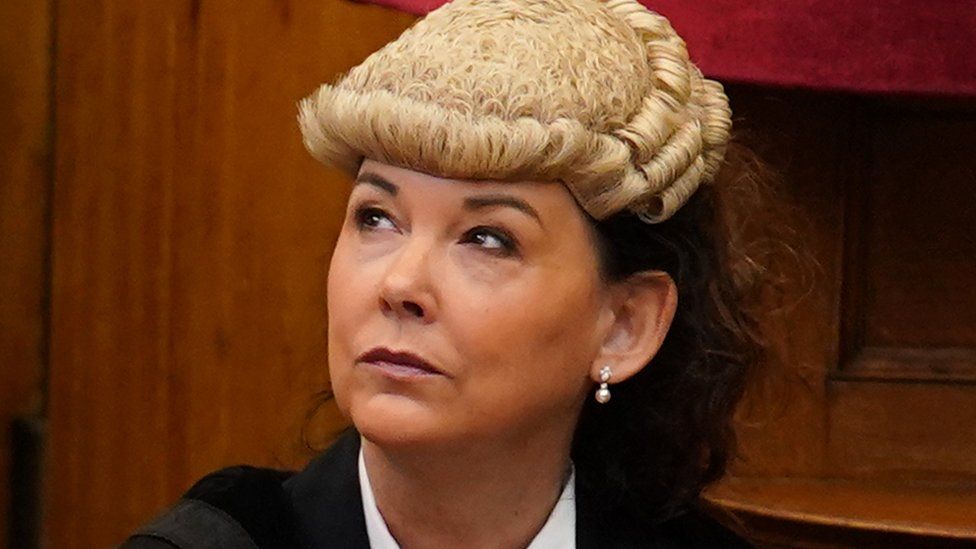
Lord Advocate Dorothy Bain has asked the appeal court to overturn a ruling made by five judges in 1997
By David Cowan
Home affairs correspondent, BBC Scotland
Scotland’s top law officer is seeking a change in the rules on evidence which could allow far more prosecutions to be brought in rape cases.
In a rare legal move, Lord Advocate Dorothy Bain has asked the appeal court to overturn a ruling made by five judges in 1997.
The case is being heard by a panel of seven judges.
Another senior lawyer is in court opposing the move, arguing the change could lead to wrongful convictions.
The vast majority of rape allegations do not reach court because of insufficient evidence.
To secure a rape conviction, prosecutors need to prove beyond reasonable doubt that the person on trial was the perpetrator, that there was no consent and that the physical act of rape took place.
Under the 1997 ruling, independent evidence of an alleged victim’s distress can only be used to prove lack of consent.
If the lord advocate is successful, the law will be changed to allow evidence of distress to also support the claim that the act of rape took place.
Appeal court
Dr Andrew Tickell, a law lecturer at Glasgow Caledonian University, told the BBC: “This would have a very significant effect on the practice of our criminal courts.
“It will increase the number of cases that might result in convictions.”
The lord advocate has asked the appeal court to consider the issue after a trial in Aberdeen.
Three witnesses at the trial said the alleged victim had been distressed and screaming that she was raped.
The trial judge told the jury that under the law, the witnesses’ evidence of her distress could not be used to support her allegation.
The accused was cleared by a majority not proven verdict.
In written submissions, the lord advocate told the seven appeal court judges that it was wrong to treat distress differently from other forms of circumstantial evidence.
She said the 1997 ruling was at odds with decisions in subsequent cases.
Ms Bain argued that it placed Scotland out of step with the approach taken in other “leading Commonwealth jurisdictions”.
She asked the court to overturn the decision from 25 years ago and to state that independent evidence of distress can be used to support an alleged victim’s testimony that they were raped.
The opposite argument has been put forward by a legal team led by Roddy Dunlop KC, the Dean of the Faculty of Advocates.
They said evidence of distress “tells one nothing about the mode of assault”.
They argue that the change would bring about a relaxation of the ancient rule of corroboration, which requires the essential facts of a crime to be established by evidence from at least two independent sources.
No corroboration
“It would remove something that has for centuries been seen to be a vital safeguard,” their submission said.
“Removing that safeguard raises the real possibility of convictions which are simply not merited.”
Mr Dunlop’s submission told the seven judges that any change should be implemented not by them but by the Scottish Parliament, with appropriate safeguards.
The Bible and legal texts from 1693 are quoted in the submissions to the Appeal Court in Edinburgh.
Dr Tickell told the BBC: “The only cases which get to court and get in front of judges and juries are ones where we have corroboration.
“Hundreds, maybe even thousands, in any given year fall by the wayside because there’s no corroboration of the essential facts.
“If this case is successful, a greater number of sexual offence cases will be able to get to court.”
The judges’ decision will be announced at a later date and will not affect the outcome of the case which was heard in Aberdeen.








